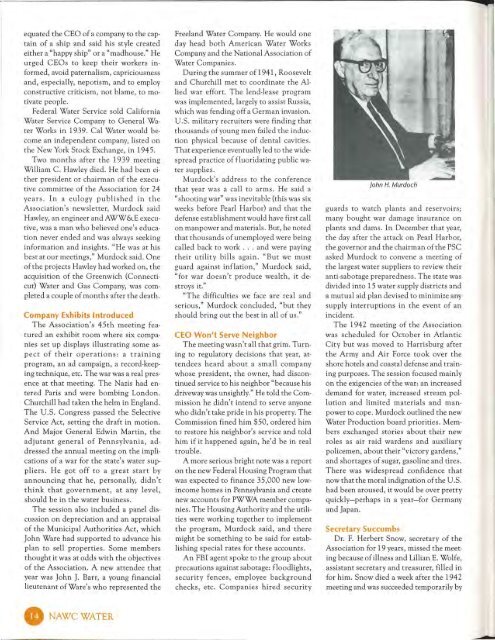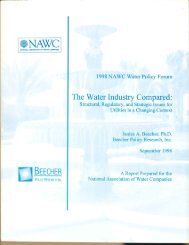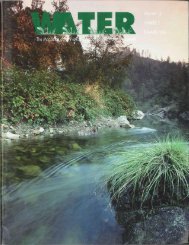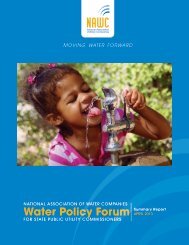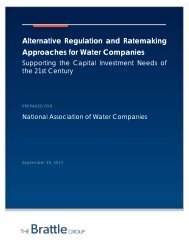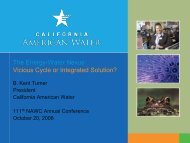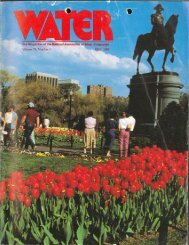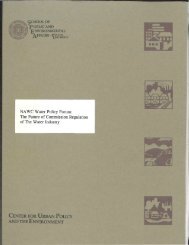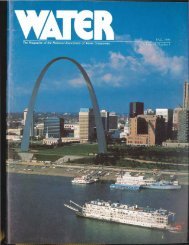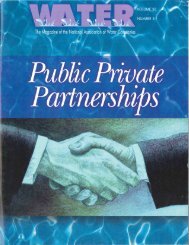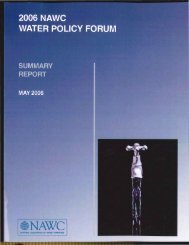Vol 36, No. 1 - NAWC
Vol 36, No. 1 - NAWC
Vol 36, No. 1 - NAWC
You also want an ePaper? Increase the reach of your titles
YUMPU automatically turns print PDFs into web optimized ePapers that Google loves.
equated the CEO of a company to the captain<br />
of a ship and said his style created<br />
either a "happy ship" or a "madhouse." He<br />
urged CEOs to keep their workers informed,<br />
avoid paternalism, capriciousness<br />
and, especially, nepotism, and to employ<br />
constructive criticism, not blame, to motivate<br />
people.<br />
Federal Water Service sold California<br />
Water Service Company to General Water<br />
Works in 1939. Cal Water would become<br />
an independent company, listed on<br />
the New York Stock Exchange, in 1945.<br />
Two months after the 1939 meeting<br />
William C. Hawley died. He had been either<br />
president or chairman of the executive<br />
committee of the Association for 24<br />
years. In a eulogy published in the<br />
Association's newsletter, Murdock said<br />
Hawley, an engineer and AWW&E executive,<br />
was a man who believed one's education<br />
never ended and was always seeking<br />
information and insights. "He was at his<br />
best at our meetings," Murdock said. One<br />
of the projects Hawley had worked on, the<br />
acquisition of the Greenwich (Connecticut)<br />
Water and Gas Company, was completed<br />
a couple of months after the death.<br />
Company Exhibits Introduced<br />
The Association's 45th meeting featured<br />
an exhibit room where six companies<br />
set up displays illustrating some aspect<br />
of their operations: a training<br />
program, an ad campaign, a record-keeping<br />
technique, etc. The war was a real presence<br />
at that meeting. The Nazis had entered<br />
Paris and were bombing London.<br />
Churchill had taken the helm in England.<br />
The U.S. Congress passed the Selective<br />
Service Act, setting the draft in motion.<br />
And Major General Edwin Martin, the<br />
adjutant general of Pennsylvania, addressed<br />
the annual meeting on the implications<br />
of a war for the state's water suppliers.<br />
He got off to a great start by<br />
announcing that he, personally, didn't<br />
think that government, at any level,<br />
should be in the water business.<br />
The session also included a panel discussion<br />
on depreciation and an appraisal<br />
of the Municipal Authorities Act, which<br />
John Ware had supported to advance his<br />
plan to sell properties. Some members<br />
thought it was at odds with the objectives<br />
of the Association. A new attendee that<br />
year was John J. Barr, a young financial<br />
lieutenant of Ware's who represented the<br />
Freeland Water Company. He would one<br />
day head both American Water Works<br />
Company and the National Association of<br />
Water Companies.<br />
During the summer of 1941, Roosevelt<br />
and Churchill met to coordinate the Allied<br />
war effort. The lend-lease program<br />
was implemented, largely to assist Russia,<br />
which was fending off a German invasion.<br />
U.S. military recruiters were finding that<br />
thousands of young men failed the induction<br />
physical because of dental cavities.<br />
That experience eventually led to the widespread<br />
practice of fluoridating public water<br />
supplies.<br />
Murdock's address to the conference<br />
that year was a call to arms. He said a<br />
"shooting war" was inevitable (this was six<br />
weeks before Pearl Harbor) and that the<br />
defense establishment would have first call<br />
on manpower and materials. But, he noted<br />
that thousands of unemployed were being<br />
called back to work ... and were paying<br />
their utility bills again. "But we must<br />
guard against inflation," Murdock said,<br />
"for war doesn't produce wealth, it destroys<br />
it."<br />
"The difficulties we face are real and<br />
serious," Murdock concluded, "but they<br />
should bring out the best in all of us."<br />
CEO Won't Serve Neighbor<br />
The meeting wasn't all that grim. T urning<br />
to regulatory decisions that year, attendees<br />
heard about a small company<br />
whose president, the owner, had discontinued<br />
service to his neighbor "because his<br />
driveway was unsightly." He told the Commission<br />
he didn't intend to serve anyone<br />
who didn't take pride in his property. The<br />
Commission fined him $50, ordered him<br />
to restore his neighbor's service and told<br />
him if it happened again, he'd be in real<br />
trouble.<br />
A more serious bright note was a report<br />
on the new Federal Housing Program that<br />
was expected to finance 35,000 new lowincome<br />
homes in Pennsylvania and create<br />
new accounts for PWWA member companies.<br />
The Housing Authority and the utilities<br />
were working together to implement<br />
the program, Murdock said, and there<br />
might be something to be said for establishing<br />
special rates for these accounts.<br />
An FBI agent spoke to the group about<br />
precautions against sabotage: floodlights,<br />
security fences, employee background<br />
checks, etc. Companies hired security<br />
John H. Murdoch<br />
guards to watch plants and reservoirs;<br />
many bought war damage insurance on<br />
plants and dams. In December that year,<br />
the day after the attack on Pearl Harbor,<br />
the governor and the chairman of the PSC<br />
asked Murdock to convene a meeting of<br />
the largest water suppliers to review their<br />
anti-sabotage preparedness. The state was<br />
divided into 15 water supply districts and<br />
a mutual aid plan devised to minimize any<br />
supply interruptions in the event of an<br />
incident.<br />
The 1942 meeting of the Association<br />
was scheduled for October in Atlantic<br />
City but was moved to Harrisburg after<br />
the Army and Air Force took over the<br />
shore hotels and coastal defense and training<br />
purposes. The session focused mainly<br />
on the exigencies of the war: an increased<br />
demand for water, increased stream pollution<br />
and limited materials and manpower<br />
to cope. Murdock outlined the new<br />
Water Production board priorities. Members<br />
exchanged stories about their new<br />
roles as air raid wardens and auxiliary<br />
policemen, about their "victory gardens,"<br />
and shortages of sugar, gasoline and tires.<br />
There was widespread confidence that<br />
now that the moral indignation of the U.S.<br />
had been aroused, it would be over pretty<br />
quickly-perhaps in a year-for Germany<br />
and Japan.<br />
Secretary Succumbs<br />
Dr. F. Herbert Snow, secretary of the<br />
Association for 19 years, missed the meeting<br />
because of illness and Lillian E. Wolfe,<br />
assistant secretary and treasurer, filled in<br />
for him. Snow died a week after the 1942<br />
meeting and was succeeded temporarily by<br />
• <strong>NAWC</strong>WATER


